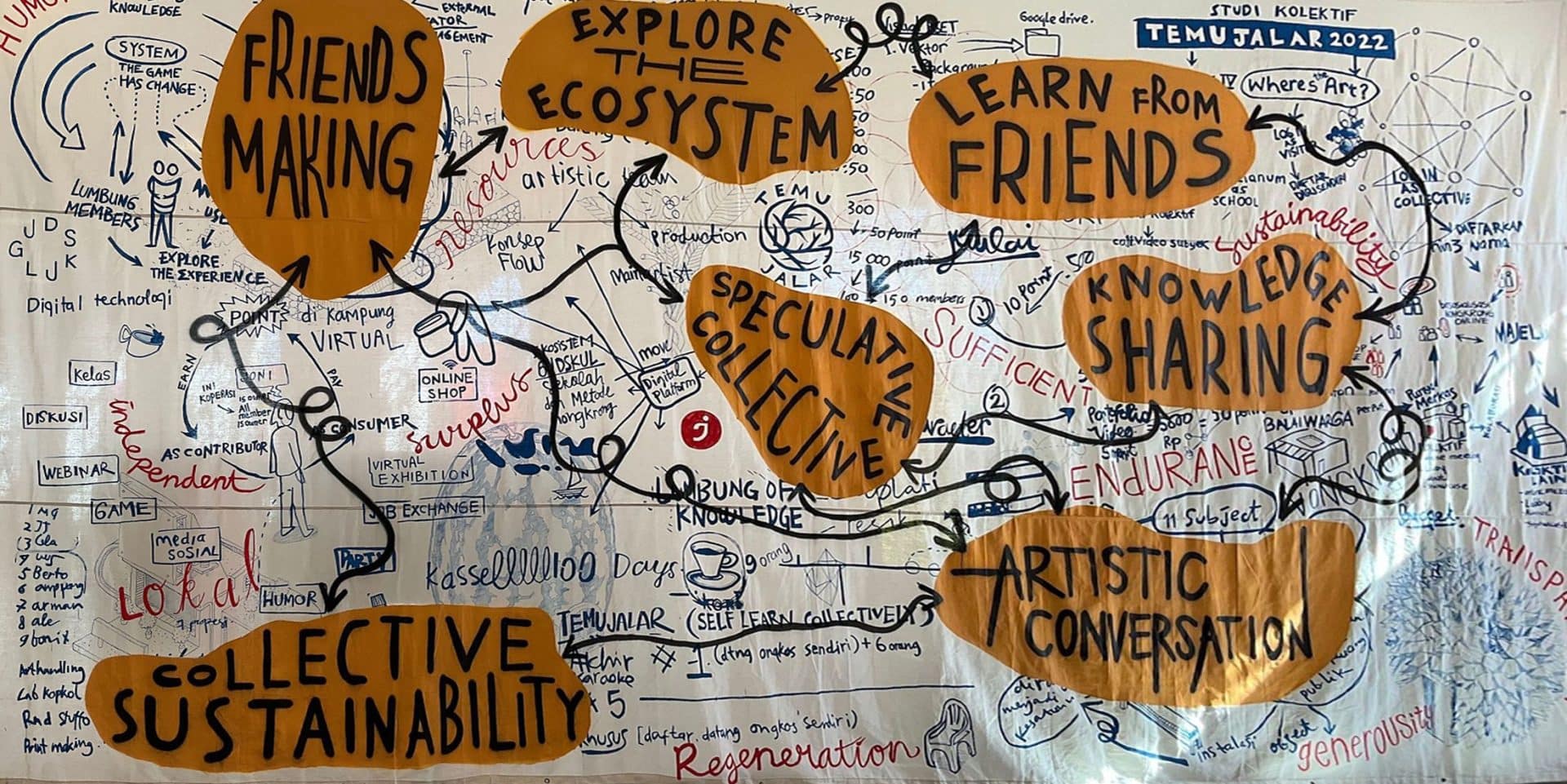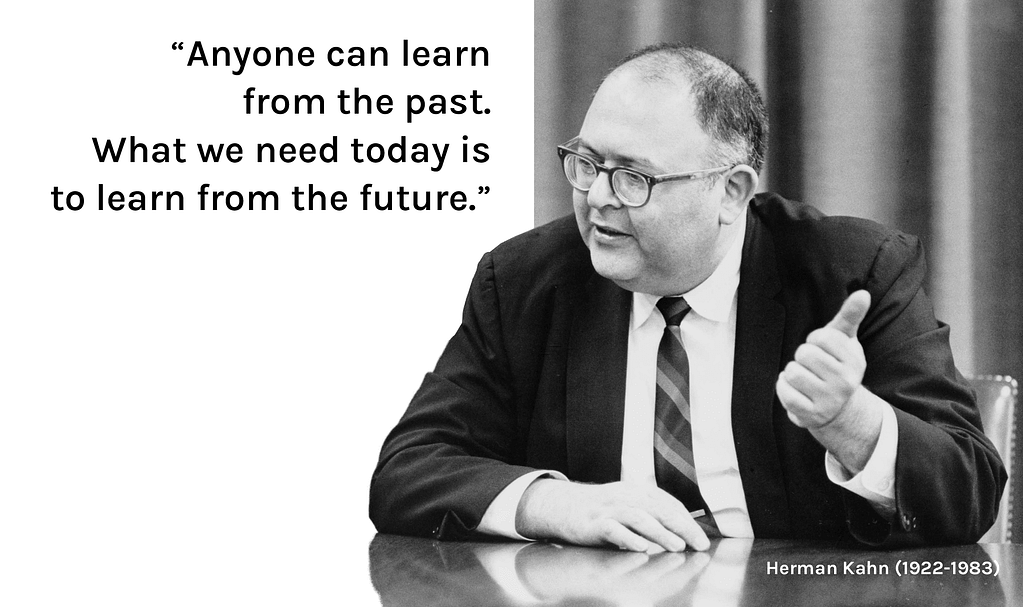
Gudskull, Documenta Fifteen 2022, Kassel, Germany
Future literacy in education: some proposals
A lot is happening in education, innovation and broadening are a great asset. “21st Century Skills” cause a shift from content to the skills needed to acquire knowledge and competences to be able to work together. The increasing opportunities for students to put together an individual learning route also show that it is recognized that more differentiation is needed.
It is precisely in these very hopeful movements that we want to draw attention to a number of deeper-lying principles that should also be included in the renewal. It is good to adapt education to modern means and needs, it is even more contributing when we understand the fundamentals of what is being asked. This is our attempt to map them.
Proposal 1: Perceiving and understanding the world from its context.
Education can make an important contribution to this. It can do so by the way it is taught and by making specific content available.
We are currently repairing a lot. Fixing the negative effects of what we’ve come up with. Whether it’s plastics and PFAS that have entered our bodies or the overproduction of food in a delicate natural environment that can’t cope.
What we want to make possible is that people can be trained from an early age in looking, thinking, designing and acting systemically. That way, we prevent future inventions from having unwanted effects on our environment.
Take plastics, for example, if they were invented from a systemic perspective, then they should also be able to be reduced to their elementary building blocks. Or agriculture would not have become intensive if we had realized earlier that the earth cannot give infinitely. We would have found other ways.
We think it is necessary to ask two questions for every subject that is paid attention to in education when designing a learning environment:
- Is the entire system, of which the subject is a part, sufficiently included in learning about it? (A whole system is a system that can function on its own.)
- Are the actors involved in the subject within the system sufficiently involved in learning about it?
Systemic looking, thinking and acting will become an essential part of education if we want young people to be able to start contributing to the future. Systemic looking and acting will have to be a common thread throughout the learning journey. It is perhaps most needed in secondary, higher and university education, where teaching is still often focused on specialism and expertise. Young people are often not yet practiced seeing the connections between parts by themselves; the learning environment will have to help them do that.
That way, we will need to fix less in the future because we have already thought about the consequences and implications of an invention in the design and assembly process, within the dynamic systemic equilibrium where the invention will be used.

Proposal 2: Observing and stimulating uniqueness
Yet, our education system is still not very well-equipped to develop this uniqueness. Because there are still too many aspects in education that promote conformity. Think, for example, of studying to “pass” a propaedeutic (or foundation) year or a course. The marking of acquired competencies or skills is a higher goal than one’s own learning path and originality.
This starts with the idea that we think we know what knowledge a young person needs to have a successful (working) life. However, the most authentic and fundamental discoveries have been made by people following their own fascinations in their learning path. Before you say: “Some kids don’t have that!”, you are right, some don’t. The reality is, they do not have those capacities because they never had the opportunity to discover and to practice them.
Fortunately, there are all kinds of developments in education in which pupils are shaping their own learning path, based on the learning questions they encounter while studying a subject. However, learning facilitators (in whatever role) in these new movements often still lack practice in recognizing and encouraging uniqueness. In addition, it is important to remember that these tutors work in an environment where the opportunity to develop uniqueness is limited, even for themselves.
Our social capacity, at its best, is able to see the uniqueness of each person and relate to it. It takes practice to learn to discover another person’s originality, but if we enable such a process with our attention, we can look forward to the beauty that arises when someone creates something out of authenticity.

Balancing Stones, Paul Harnischfeger
Proposal 3: Restoring the healthy balance between expression and impression
This has mainly to do with the fact that man is innately an expressive being. Everyone wants to express themselves and contribute. The way in which and the direction of the expression is unique for each person. But when we look at the course of the learning journey from primary school to university, we see that as it progresses, more adaptation to form and standard is required. Information is brought in and checked for adequate mastery and handling. There is little room for originality in the system, and recognizing and encouraging this depends entirely on the quality of the teacher.
Much less attention is paid to the expression side of learning, and by that we do not only mean expression subjects such as drawing or music. As a result, many young people, when they come out of the education system, are “expressively” untrained. They have only limited ways in which they can express themselves. In addition, the content of much education is based on general assumptions about what a young person should learn, and how. That makes it very difficult to practice one’s own way of expression, both in doing things and expressing yourself in your own way. And that, of course, also has consequences for being able to recognize the uniqueness of others.
We see that the benchmark of young people then becomes more limited; anything outside the group standard must be condemned, and people think they see something unique in an extreme form of expression. Both are marks of untrained expression skills. We become less human from less expression and more conforming from excessive impression. As a result, we increasingly go and have to adapt to an unimaginative norm.
Developed expression is obtained through exercise of the senses and requires the use of the whole body. The mark of trained senses is non judgment, the mark of untrained senses, alas, the opposite. We acquire awakened senses by observing expressiveness in our environment: sport, art, behavior of others, cooperation and intelligence. The senses, however, are not exercised in a state of passivity. Viewing Instagram and TikTok messages do not increase expression skills, recording and posting dances online does. Too little expression leads to depression and to a self-knowledge that comes from reflections rather than experiences.
The impression teaching method mainly teaches us what is already known, while the expression develops a skill that feels at home in the unknown, unpredictable and uncertain.
But the most important thing about the outward nature of the expression is that the connection to the world is made through activities (on which I naturally reflect) rather than reflections. I stay connected to the reality of the world and my fellow human beings, and I don’t get trapped in my own bubble.
When I’m well practiced, I see the things outside of me that I don’t see when I’m too busy with myself and my own world. I no longer look outside to find what I am looking for, but to see what is there.

Artwork in the garden of the Astrid Lindgren house (Vimmerby, Småland, Sweden) by Patrick Dougherty
Proposal 4: Introducing “future skills”
Our view of education is in itself also a view of learning that is strongly shaped by how we view the future. In this view, learning has to do with preparing a person for and helping them move with the world as we have arranged it. In fact, the underlying view is that the future consists of what we have not yet learned and will learn by building on what we have already learned. In that sense, learning therefore consists of taking in, in your own way, what we as humans and humanity have already heard, developing an attitude to keep doing this and then developing it further.
The ancient Chinese insights already warned us about the misconceptions involved: we believe that the accumulation of wisdom makes the future, while the insights of the Tao (as opposed to those of Confucius) made clear how wisdom and the future are mutually exclusive. If we follow the path of wisdom, we cannot contribute to the future.
The “future” that builds on what we have learned is progress, and that means understanding more and more by using the same insights, the same basic assumptions. In the view of the Tao, this is an extended present, sometimes helpful and sometimes not. The point, according to the Tao, is that we understand when to use our powers of wisdom and when to use our powers of ignorance.
Because the future is made by what we don’t know, don’t understand yet, what we haven’t seen yet and what we don’t have a clue about. These are aspects of our ability to learn that our current education system barely focuses on.
And yet, many students are more inclined towards this way of learning.
Learning to perceive what is not yet, what we do not yet know, where unfamiliarity and uncertainty play a major role, means being prepared for being human, society, and the world in an entirely different way.
The pleasure of making an effort before we understand something, working hard before you get through it, being completely alone in unknown territory, researching without aiming for a result: these are great experiences.
Being able to persevere while you don’t see the point yet, experiencing it completely differently from others in a group, being able to appreciate even an opposite point of view: all these are skills that are greatly undervalued in our current culture and in any case unpracticed. And we need those skills to get out of the stalled views of the current system. And there are quite a few static opinions, that keep us looking for solutions within the underlying assumptions of the same view of the world that caused the problems.
People have learned to persevere with problem-solving because then you know the problem, and you work towards a concrete solution. But they haven’t learned to persevere when it’s not helpful or seems pointless, when we can’t see linearly ahead or when it’s not in our best interest.
Learning to work with unfamiliarity and uncertainty makes it possible to really tread new paths, instead of calling “new” what is actually an innovation of the existing. For that, we will have to train our unfamiliarity and uncertainty muscles. And not be too quick to look for the known path and reject what is different.
It literally means for teachers and educational systems that the methodology, technique and content of learning must be developed at the moment of learning. And that the outcome, and what it will lead to, will only be known later in time. This learning has no purpose until the purpose manifests itself. Not an easy thing for the usefulness principle (it serves something, you do something so that it leads to results) of our school system.
All people have these “wisdom” and “future” learning abilities, but each has a unique preference. By its very nature, current education has a strong preference for “wisdom”, both in content and in approach. Consequently, there are many who are left out or risk their talents and uniqueness and even health by trying to develop within the current system anyway.
It is not a problem of the students (and all their “ills”), it is a problem of our conception of the future.

Phenomena as clues instead of deviations
The personal experience of discomfort, impossibility or ill health is seen as an inability of the pupil or student rather than as an indication of a one-sidedness in the system. And thus we provide all the help and support to adapt the individual to the system, in the form of coaching and tutoring, labeling (as ADD and ADHD) and even medication. We don’t doubt the best of intentions and the expertise of these interventions, but we do not agree with the worldview that lies behind it. For that says, you can only move into the future if you adapt yourself to the system and its conditions. The same system, mind you, whose underlying worldview has created many of the challenges we are currently facing.
The education system, by its chosen foundation and habits, excludes those who have different gifts and skills from those expected by our conception of development. And since education is merely a representation of society, those who fit in easily are also those who maintain the same basic assumptions. And thereby take the same or similar social, economic and environmental steps forward and then continue to create problems in the belief that they are actually helping to solve them.
Every person has a different way of learning. If you really want people to learn as much as possible, then in addition to the skill of moving along and adapting, they will also have to practice the ability to adapt as little as possible. That means you might need as many as 30 methodologies in a group of students. Not methodologies that have already been developed, but methodologies that, as we wrote earlier, are developed at the time of learning.
For the future, it is important that we see the meaning of maladjustment, resistance and ailments that our children show: whether it is ADHD, telephone addiction or no longer wanting to participate in society.
We can regard them as symptoms of ill health, or as indications that we need to provide fundamentally different education in which these deviations turn out to be skills: in which the behavior of our children indicates what education should add to what it already has to offer. Education appropriate to what the future demands of us, and less education that thinks it knows what the future demands of us.
If you believe that education should provide security, then by all means keep using and innovating the current education system.
If you want to create a learning environment to practice contributing to the future, then you facilitate that young people can easily deal with the uncertain, the unknown and the unpredictable.
Not only education, but also parents, carers, family, friends and social institutions play an essential role in helping young people become familiar with the principles we present here.
Peter Paul Gerbrands